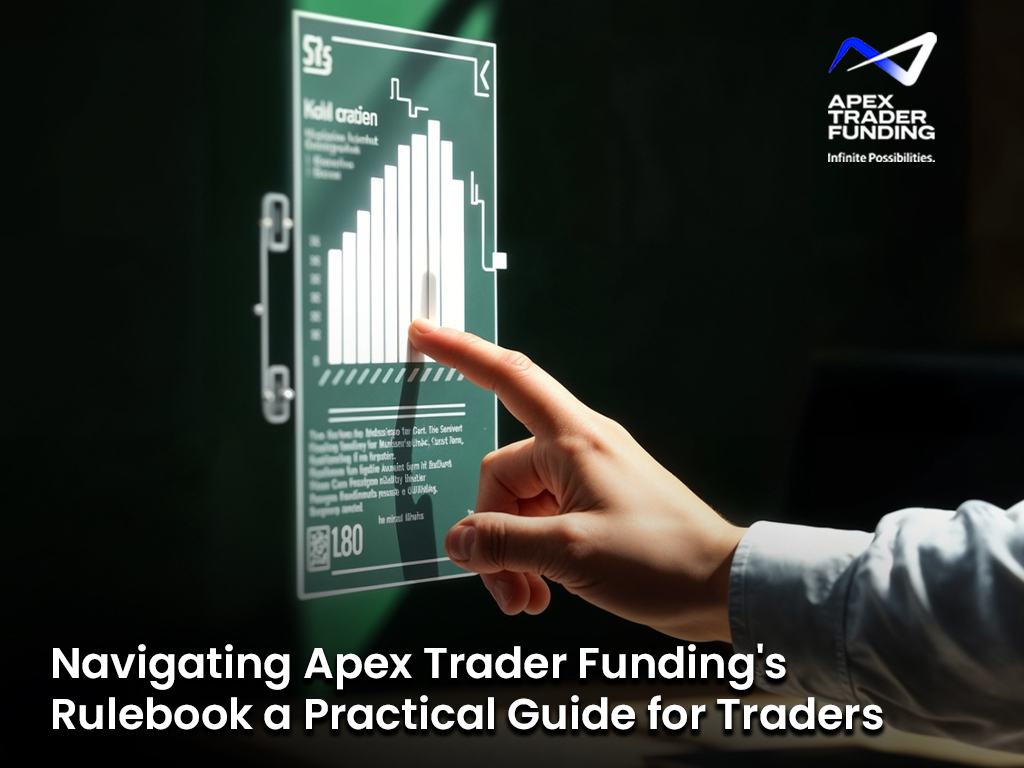
trading-inspiration | 28-04-25
Navigating Apex Trader Funding's Rulebook: A Practical Guide for Traders
In today’s high-stakes world of futures trading, precision, patience, and discipline define those who succeed over the long haul. While raw talent and intuition matter, what separates consistent performers from inconsistent ones is structure. That’s where Apex Trader Funding shines. As one of the best prop firms available today, Apex has built a reputation on transparency, trader support, and a clearly defined rule system. Whether you’re just starting or you're an experienced funded trader or elsewhere, understanding and mastering the platform’s updated rules is critical for success.
These rules aren’t simply constraints; they're designed to elevate performance, reduce emotional trading, and enhance decision-making processes. By implementing key updates like mandatory bracket orders and stricter guidelines for risk management, Apex is helping traders develop the habits necessary for long-term sustainability. With features accessible via top trading platforms like the Rithmic trading platform, Tradovate trading platform, and WealthCharts, Apex provides the full toolkit to help traders thrive in volatile markets.
As a growing number of traders explore proprietary trading to leverage skills without risking personal capital, Apex’s model is particularly valuable. In Brazil, where interest in futures trading and stock trading platforms continues to grow, Apex offers one of the best trading platforms for serious traders. With global access and a tech-savvy structure, the firm is redefining what it means to be Apex funded.
Why Trading Rules Are Core to Success
Trading without rules is like sailing without a compass no matter how skilled the sailor, they’re bound to drift. At Apex Trader Funding, the implementation of structured rules acts as both a guide and a safety mechanism. For traders operating funded trading accounts, or anywhere else, these rules provide the clarity and discipline needed to execute under pressure.
Unlike demo trading or loosely structured environments, Apex imposes a framework designed to help traders build repeatable systems. This approach especially benefits traders who are working to transition from simulation to real capital management. Every trader is assessed not only on profitability but also on their adherence to structure emphasizing long-term viability over short-term gains.
Moreover, by reinforcing consistency, the Apex model helps elevate a trader's performance on any trading website or platform they prefer. Whether you trade through WealthCharts, Tradovate, or Rithmic, Apex’s systems and requirements sync easily with these platforms, offering seamless integration for technical execution and account monitoring.
Ultimately, this structured environment mirrors the institutional world. It instills the kind of discipline professional traders live by transforming the casual approach many retail traders fall into into a more calculated, business-like mindset. This is how Apex sets the bar high not just to protect its capital, but to develop Apex funded traders capable of thriving across any market.
Mandatory Bracket Orders: Built-In Risk Parameters
Apex’s requirement for bracket orders is more than just a rule; it's a methodology that anchors each trade on purpose. For those trading in volatile environments like futures trading in Brazil, setting predefined exit points ensures that traders don't leave outcomes to chance. This feature, standard across most top-tier trading platforms, allows for calculated risk management from the outset.
By requiring both stop loss and take profit levels, Apex forces traders to define the trade's success and failure before they enter. This mitigates emotional decisions and enables clear post-trade analysis. Whether you're using the Tradovate trading platform for its sleek interface or Rithmic for its low-latency order execution, bracket orders help you stay accountable to your plan.
For traders utilizing Apex Wealthcharts trader funding, this feature aligns perfectly with their backtesting tools and strategy analysis dashboards. Each trade becomes a data point, feeding into a feedback loop of improvement.
The result? Better risk management, increased consistency, and fewer impulsive errors. Whether you’re a day trader based in São Paulo or a swing trader managing funded trading accounts in Brazil, this rule alone has the potential to change how you view every single trade. It’s a non-negotiable tool for those looking to master structure in proprietary trading.

Cultivating a Risk-Aware Mindset
For traders using funded trading accounts in Brazil or any other region, mastering risk management is not optional, it's essential. Apex Trader Funding has embedded this philosophy into its rulebook, mandating that every trade must reflect a thoughtful balance between potential reward and potential loss. At its core, the rule isn’t about limiting creativity; it’s about safeguarding trader longevity and capital efficiency.
Risk management at Apex is more than just setting stop losses. It’s about understanding trade impact. Each setup must be analyzed in terms of statistical edge, drawdown impact, and account sustainability. This is especially important in futures trading, where leverage can magnify both gains and mistakes in equal measure.
For traders using Apex through the Rithmic trading platform or WealthCharts, risk parameters are easily visualized, with built-in features that highlight position size relative to stop-loss distance. These insights help reduce overexposure and encourage disciplined sizing. The more structured your trade, the less room there is for costly emotional reactions.
This approach cultivates a mindset where losing trades are accepted as part of the process not feared. The most successful traders aren’t those who avoid losses entirely, but those who manage them effectively and move forward. And in the Apex ecosystem, this philosophy is not only supported, it's required.
Risk-to-Reward Ratios: Rethinking Conventional Norms
Traditional trading education often pushes the idea of maintaining a 1:2 or better risk-to-reward ratio. While sound in theory, real market conditions can render this impractical. Apex recognizes this and allows traders the flexibility to deviate from rigid expectations as long as the math supports it. This opens up the playing field for Apex funded traders utilizing systems that thrive on high win rates and smaller targets.
For instance, a trader using a micro-scalping strategy on the Tradovate trading platform may risk 12 ticks to gain just 5. On the surface, this seems unwise. But if that trader has an 85% win rate, the structure becomes viable. Apex doesn't restrict this model; instead, it urges accountability. Traders must understand the statistical implications of their chosen ratios.
This flexibility is particularly useful for traders in markets like Brazil, where futures trading in Brazil often includes high volatility and unpredictable liquidity shifts. Having the option to adapt risk-to-reward setups gives traders the power to fine-tune their edge within the Apex structure.
Ultimately, Apex isn’t enforcing arbitrary ratios, it's promoting sustainability. Whether you're a scalper or a trend trader, as long as your win rate supports the math, your strategy is welcome. This forward-thinking approach reflects Apex’s commitment to innovation and its status among the best prop firms in the industry.
Why DCA Into Losses Is Prohibited
In long-term investing, dollar cost averaging into a declining asset can smooth out entry points. But in futures trading, particularly when leveraged, this tactic can quickly spiral into disaster. That’s why Apex has taken a firm stance: no averaging down into losers in Performance Accounts.
This rule protects traders, especially newer ones from themselves. Emotional trading often leads to denial, with traders doubling down in the hope of a rebound. But Apex isn’t a place for hope-based trading. As one of the most disciplined proprietary trading environments online, it requires traders to treat every entry as a calculated risk with clearly defined invalidation points.
This restriction also promotes psychological clarity. Instead of averaging and hoping, traders must acknowledge when a trade has failed. This encourages faster exits, smaller losses, and quicker resets. It’s a more professional way to trade and aligns closely with the strategies of institutional desks and advanced quant models.
Whether you're using Apex Wealthcharts trader funding to test multi-asset strategies or scalping indices on Rithmic, the no-DCA rule keeps your trades sharp and intentional. Over time, it fosters the kind of resilience required for true consistency something Apex is known for nurturing.
Scaling Into Strength: Building Winning Positions
While Apex prohibits adding to losing positions, it strongly supports scaling into winners a principle that builds on momentum rather than speculation. This is a tactic often reserved for high-level institutional traders, and Apex makes it accessible to all Apex funded participants.
Scaling into a position means adding size as the trade proves successful. It’s not guesswork, it's an intentional tactic with rules. Traders can, for example, take an initial entry at a key support level, then add size as the price breaks through resistance. With platforms like Tradovate and WealthCharts, this process is intuitive, offering real-time position tracking and trailing stop management.
This method minimizes early exposure and maximizes gains only when trades go in your favor. For traders in high-volatility environments like futures trading in Brazil, this approach limits risk while capturing strong moves. It also reduces emotional pressure since you're never fully exposed at the start.
By encouraging scaling into strength, Apex promotes smart growth and performance-based position management. It reinforces the mindset that good trades should be rewarded, not risky ones. And as you scale with success, your account grows more safely, allowing for consistent progress in a rule-driven environment.
Evaluation vs Performance Accounts: A Two-Phase Trader Journey
Apex Trader Funding’s structure is designed to balance opportunity with accountability, and nowhere is that clearer than in the transition from Evaluation Accounts to Performance Accounts. This distinction allows traders to develop their edge without the pressure of live capital while preparing them for the full rigor of Apex’s rule-based ecosystem.
In the Evaluation phase, traders are given flexibility rules in place, but bracket orders and DCA restrictions are relaxed. This lets traders experiment, refine setups, and test strategies using platforms like WealthCharts or the Rithmic trading platform without immediately facing the constraints of real-money management. For those testing in regional markets like Brazil, it’s an ideal way to assess strategies against the unique volatility of futures trading in Brazil before transitioning to live performance.
Once the evaluation criteria are passed, traders are invited to a Performance Account. Here, Apex’s full rule set is enforced: bracket orders become mandatory, DCA into losers is prohibited, and a higher standard of risk control is expected. This shift ensures only disciplined, structured traders progress with capital at stake.
This progression mirrors professional training: educate first, perform later. Apex’s two-phase path fosters both confidence and competence, creating more prepared and resilient Apex funded traders across global markets.

Managing the Bracket Order Display: Clarity vs Clutter
One often overlooked element in modern trading is chart clarity. Visual noise can be a genuine distraction, especially for traders who value clean setups and minimalism. With mandatory bracket orders in place at Apex, some traders express concern about cluttered visuals but there are smart ways to address this.
Platforms supported by Apex, like Tradovate, Rithmic, and WealthCharts, offer deep customization. Traders can adjust the opacity of orders, change line styles, or assign visual markers that blend with the chart theme. Many top stock trading platforms in Brazil now also support multi-monitor setups, allowing separation between trade execution and analysis windows.
But beyond aesthetics, there’s a functional reason for embracing these visuals. Seeing your stop loss and take profit levels live on the chart reinforces accountability. It becomes a real-time reminder of your trade plan. Instead of viewing them as distractions, traders who adapt to the visual feedback of bracket orders often make fewer mistakes and execute more consistently.
Clutter is only clutter if you don’t use it. With the right adjustments, bracket visuals become part of your edge not a hindrance to it.
The Apex Advantage: More Than Just a Trading Account
Apex Trader Funding sets itself apart in the proprietary trading world through its balance of trader-friendly policies, robust tech integration, and a high-payout model. Unlike firms that limit access or cap profits, Apex provides traders a generous structure: 100% of the first $25,000 in profits and 90% thereafter. This is an industry-leading approach that gives traders true earning potential.
For those looking for a trading website that merges structure with opportunity, Apex is an ideal choice. Whether you're starting your journey or managing multiple funded trading accounts in Brazil, the firm's flexible evaluations and cost-effective access lower the barrier to entry significantly. Plus, regular discounts such as 50% off with the Apex coupon code “COPY” make it affordable to test your edge without overexposing capital.
Technologically, the firm provides access to the best trading platforms, including Tradovate trading platform, Rithmic, and WealthCharts, each offering real-time execution, customizable dashboards, and data-rich interfaces tailored to serious traders. These tools allow for precision strategy development and professional-grade performance tracking.
Apex’s holistic model also includes community support, educational content, and feedback from active professionals, positioning it as more than just a funder; it's a partner in long-term growth.
Aligning Strategy With Structure: Trading With Purpose
Trading successfully under Apex’s framework means adapting, not abandoning your current strategy. Whether you're a scalper using the best trading platform in Brazil or a swing trader on Rithmic, your system can work with Apex’s structure if you build it intentionally.
Start with precise entry criteria. Define what signals a valid trade, then layer on a well-placed stop loss and a realistic take profit. Apex’s bracket order requirement reinforces this structure and rewards those who follow it consistently. Next, calculate your ideal trade size relative to drawdown limits, ensuring your plan aligns with account safety.
For those scaling into winners, build decision points based on market structure or indicators from platforms like WealthCharts. Each layer should be predefined, not reactive. Incorporate trailing stops or break-even mechanics to manage growing positions while securing profits.
By integrating your personal edge within Apex’s blueprint, your trading becomes more data-driven and less emotional. This combination of structure and freedom is what allows Apex traders to refine performance over time especially in competitive environments like futures trading.
Avoiding Common Pitfalls in Apex’s Trading Environment
Even with clear rules, traders often sabotage themselves through preventable errors. One of the most frequent mistakes is entering trades without activating the required bracket orders. This not only breaks policy it leaves the position vulnerable to uncontrolled loss.
Another major trap is failing to differentiate between Evaluation and Performance Accounts. Traders who treat both phases the same often carry bad habits into live environments, such as overtrading or inconsistent setups. Treat your evaluation phase like it's your business. Build habits now that will serve you later.
For traders on platforms like WealthCharts or Tradovate, make use of journal integrations and performance dashboards. Track your risk-to-reward ratios and ensure they make mathematical sense. If you're using a 1:3 risk-to-reward structure, check if your win rate justifies it. Avoid assumptions and use data.
Lastly, remember that even the best prop firm won’t make up for a lack of discipline. Apex provides tools and funding, but the trader brings the system and mindset. Awareness, responsibility, and precision are the antidotes to the most common errors.
Growth Through Rules: Turning Structure Into Strength
Rules are often seen as obstacles, but at Apex, they are stepping stones. Each requirement from stop losses to scaling guidelines is designed to instill clarity and control in your decision-making. Over time, this structure enhances performance, removes impulsiveness, and sharpens edge execution.
Traders who resist rules tend to cycle through inconsistent results. Traders who embrace them often find new layers of strength in their approach. This shift mental and mechanical is how a strategy evolves into a trading business.
Whether you're using Apex Wealthcharts trader funding for analytics or executing on the Tradovate trading platform, the structured feedback you receive helps refine your setups, improve your psychology, and track your growth.
At its core, Apex isn’t trying to limit you, it's trying to level you up. By providing structure, it clears a path to excellence. And traders who align with that path tend to outperform and outlast those who don’t.
Final Thoughts: Trade Smart, Trade Apex
In a fast-moving financial world, the need for clear rules and consistent execution is more relevant than ever. Apex Trader Funding's model, built on structure, advanced technology, and transparent payouts, is engineered to support traders ready to grow responsibly.
Whether you're exploring funded trader in Brazil opportunities or trading globally, Apex offers the roadmap. The firm's balance of accountability and flexibility combined with platforms like Rithmic, Tradovate, and WealthCharts gives you every tool to succeed. But it’s not just about tools; it’s about how you use them.
For those ready to transform their trading from uncertain to professional, Apex is more than a funding solution, it's a launchpad.
🔹 Use code "COPY" at ApexTraderFunding.com to avail current discounts available on evaluation accounts. Step into the structured world of trading with purpose. Start smart. Scale smart. Trade Apex.
Related Blogs

trading-inspiration | 19-04-25
The Path to Becoming a Funded Trader: A 7-Step Guide to Success
The Path to Becoming a Funded Trader: A 7-Step Guide to SuccessTrading in financial markets presents an exciting avenue for...
Read more
trading-inspiration | 19-04-25
Mastering Trading with Apex Trader Funding: A Comprehensive Guide
Mastering Trading with Apex Trader Funding: A Comprehensive GuideNavigating the Trading LandscapeTrading in financial markets can seem complex, but with...
Read more
trading-inspiration | 28-04-25
Discover Your Edge in Futures: Leverage Apex Trader Funding’s Latest Discount
Discover Your Edge in Futures: Leverage Apex Trader Funding’s Latest DiscountIn today’s competitive trading landscape, selecting the right trading platforms...
Read more



